|
Prasadam - Squash
BY: SUN STAFF
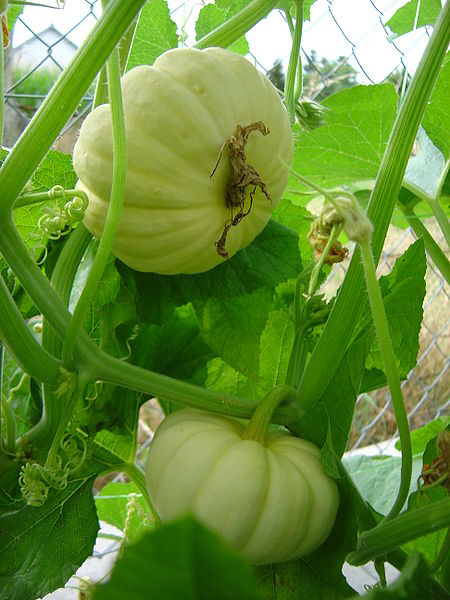
Jul 18, 2010 — CANADA (SUN) — A journey through India: border to border, bhoga to prasadam.
One of the very nicest vegetables to use when cooking for Sri Krsna is squash. Many references are found in sastra to this excellent foodstuff, and Srila Prabhupada talked about it on several occasions. He generally refers to it as squash, while the Sanskrit term found most often, in Sri Caitanya-caritamrta for example, is tumbi. In fact, there are a great many different Sanskrit terms for squash – as many as there are varieties that have been grown in India over the ages.
In the West, the term squash generally refers to a very specific category of vine-type vegetables. A few are soft-skinned, like yellow summer squash or zucchini, while others are hard-skinned, like Acorn or Hubbard squashes. Nearly all of are edible, but some are ornamental and not very palatable. The ornamentals are generally referred to as gourds rather than squash.
In India, the term squash covers a much wider range of vegetables. Even cucumbers are sometimes referred to as squash, as are bottle gourds (doodhi or lauki), bitter melons, all types of squash and gourds, and even pumpkins.
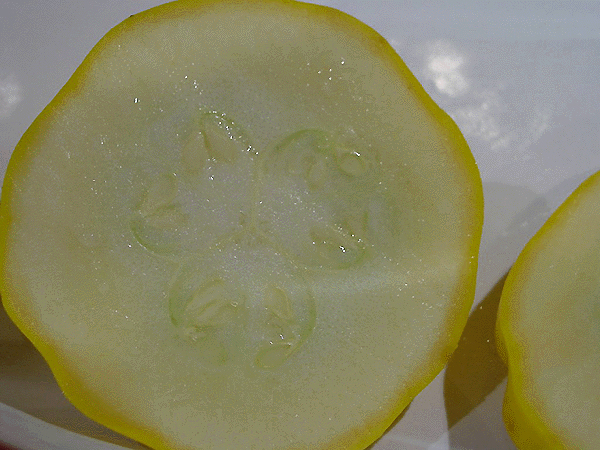
The nomenclature of squash gets even more confusing in the realm of cooking because the term dugdha is often paired with tumbi, dugdha-tumbi referring to a preparation of squash that has been cooked in milk, as a sabji or sweet dish. The Sanskrit term dugdha refers to milk, as in dhenudugdha, or cow's milk, and dugdha is also the name of a thickened cream or pudding, like rabri. But dhenudugdha is also the name for a gourd!
As you'll see at the end of this article, there are at least sixty different Sanskrit terms referring to various types of squash and gourds: sweet, bitter, wild, long and round, and everything in-between. In this segment of the Prasadam series we'll talk about several of the basic types of squash used in Indian cooking, with the exception of pumpkins, which we'll reserve for another time.
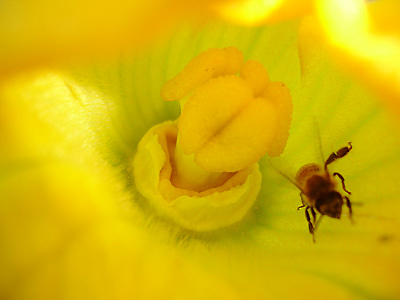
Bee pollinating a zucchini squash
Srila Prabhupada was very fond of squash, and encouraged the devotees to cook it and to grow it. He appreciated how quickly squash grew, and the nice flavor of the fruits, leaves and flowers. He mentions squash in one particularly sweet garden conversation, from Vrindavan on September 3, 1976. Caranaravindam had arranged the building of a nice space for Srila Prabhupada. While appreciating the cottage, Srila Prabhupada talked about the importance of growing food to feed the family, so that even in times of war or political unrest, they will be provided for:
Prabhupada: "Carpenter. So it is nice. When there is rain I can lie down here. When it is raining, to lie down in a cottage like this is very pleasing. At least in this country. Tuk-tuk-tuk-tuk-raining, not very forcibly.
Caranaravindam: A little shower.
Prabhupada: Shower, yes. Oh, it is very pleasing. So this place is very nice.
Caranaravindam: You like this...
Prabhupada: Oh yes. You have got idea. You have all done nice. Nobody (laughs) got this idea. You have done nice.
Caranaravindam: I wanted to make you a beautiful palace.
Prabhupada: You can fix up a little fan, then this labor can be saved.
Caranaravindam: You would like electric fan or hand pulled. Hand pulled?
Prabhupada: No no, electric. A small table fan. Just like in the railway carriage. Let them fix up. Small ceiling fan.
Hari-sauri: You can get very small ones that fasten on the front of motor cars on the inside for fanning the driver. Just a small unit.
Caranaravindam: I was wanting to, in the future, build you a very beautiful construction here.
Prabhupada: No, it is all right.
Caranaravindam: You like this. I thought you would also...
Prabhupada: This is made simple. It is very nice. Rather, you can... No, it is all right. There is no space. In India, on the roof, we allow to grow squash.
Caranaravindam: You would like some growing?
Prabhupada: Very small.
Caranaravindam: I plan to grow malati up this side.
Prabhupada: You grow, on the thatched roof they grow squash.
Hari-sauri: I think they were doing that in Mayapura. There was one big plant growing on the...
Prabhupada: So that the family can get one squash, that is sufficient for family. Vegetable. People used to live formerly without any worries. Everything was so easily available, at least foodstuffs. They had no anxiety.
Caranaravindam: Little effort, just basic, a little work and...
Prabhupada: They got their own paddy from the field, milk, some vegetables. Those who are fish eaters, they have got small lake, fish. Whole family without any... "Where I shall get money?" "How shall I eat?" These things were absent. Even the poor man.
Caranaravindam: Actually I have seen that even in all these villages in Africa and India, they have no real connection to the city politics. Because if the city breaks down they could move back to... They have their cow, they have field, vegetables...
Prabhupada: If there is war they were not affected. And the soldiers would not bother the public. It is said during Mohammedan period the soldiers of one party will ask the cultivator, "Where the other soldiers gone?" They would say, "I have seen and they have gone this side." The cultivator is going on. The fighting is going on, but the cultivator is not affected. He is free. "You fight between themselves and whoever the victor is, I shall pay taxes. That's all. I have nothing to do with politics." This was... Between two parties of king or political, they may fight. Citizens, they have nothing to do who is the victorious. "You fight and one of you will become victorious. So you take taxes. I am concerned with paying tax. And tax, tax means whatever I have grown, you take one-fourth. You see this I have grown. Now you can take away one-fourth." No income tax, no sale tax, no this tax or that tax. And if some year, by chance, he has not grown anything--no tax. "I have not produced, I could not produce anything." Very simple. Soldiers, they were not paid. They were given land by the king. "You enjoy this land without any price. But when there is fight you have to come out." Fight is not going every day. It may take place after some years. So they are living peacefully.
Caranaravindam: It was similar in old England in the knights' time.
Prabhupada: That is the whole world history. Now they have made encumbrance. Naturally, a class of men, they became soldiers. They were trained up, and...
Caranaravindam: Whenever I visited a village in India, people were always very friendly. "Sit down, take some meal." Or if I walk through a field they will pick something from a tree, some tomatoes, or some vegetables and give it to me.
Prabhupada: You can grow some tomatoes here. That is a very easy thing.
Caranaravindam: I have also some and some different seeds to plant.
Prabhupada: Tomato, squash.
Caranaravindam: You would like to see growing in your garden a little sabji?
Prabhupada: Yes. It is very... Cucumber. These things can be grown very easily. And zucchini. Called zucchini?
Hari-sauri: Yes. It's like a small marrow, zucchini.
Caranaravindam: I would like to get, I don't know...
Prabhupada: No, there is not much place here.
Caranaravindam: Some things we can grow.
Prabhupada: But this green banana if we get that will be nice.
Caranaravindam: These should flower soon, these bananas. They are one year old now. Within the next six months they should give some flowers.
Prabhupada: So it is very pleasing spot. You have done nice. I'm feeling nice.
Srila Prabhupada ended the conversation talking about the monkeys and birds, saying, "There are so many wonderful creations. That is God's inconceivable energy."
As we have seen with so many of the foodstuffs covered in this Prasadam series, squash is an extremely versatile foodstuff. It can be enjoyed in beverages, salads, breads, dals and sabjis, savouries and sweets. Many varieties are naturally sweet, and lend themselves to so many dishes. A lot of squash have a distinctive earthy, nutty flavor, making it an excellent stand-alone vegetable in any prep.
The following preparation is a great showcase for squash of any type. This green chili and coconut based sabji has the tang of raw mango and gets a burst of flavor from asofoetida and fresh curry leaves.
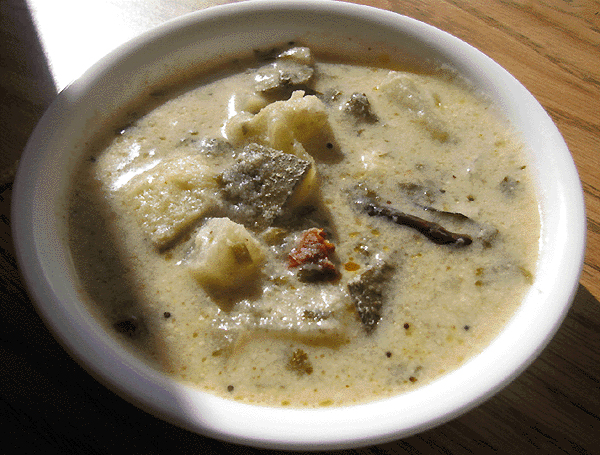
Mirsang Ambat
[Photo courtesy of RedChillies @ Wordpress]
Mirsang Ambat
(Raw Mango & Squash Curry)
Ingredients:
½ cup grated Coconut
½ cup of Squash, cubed
½ cup of Green Mango
a handful fresh Curry Leaves
3 green Chillies
½ tsp. Mustard seeds
¾ tsp. Asofoetida
Salt to taste
Ghee for frying
Coriander leaves for garnish
Boil the fresh peeled squash and mango until cooked. (If using a soft-skinned squash, leave the skin on if you like.) Make a coconut masala, grinding the coconut, chillies and salt with a little water to get a fine paste. Add the coconut paste to the vegetables, still in their water, and continue to boil. Temper the spices in a little ghee, frying the mustard seeds, curry leaves and asofetida, then add to the curry. Put the lid on the pot and turn off the heat until ready to serve. Sprinkle with minced coriander leaves and offer with rice.
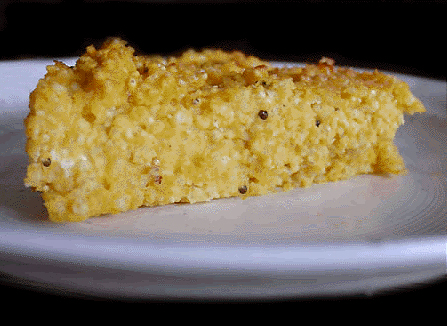
Ragi-tumbi
Here's a nice baked savoury prep featuring squash and millet, which is a very healthful and tasty grain. You can either use ragi (finger millet) or bajra for this recipe. The bajra takes longer to cook and is best soaked overnight before cooking. We prefer to use ragi, which is high in calcium and fiber, cooks faster, and has a wonderful fine texture when baked with the squash.
Ragi-tumbi
(Millet and Squash Bake)
Ingredients:
1-1/3 cup Ragi Millet
2-1/2 cups Water
2 cups Squash, peeled and cubed
1 bulb fresh Fennel
1 tsp. roasted, ground Cumin
½ tsp. Mustard seeds
¼ tsp. Asofoetida
3 Tblsp. heavy Cream
Ghee
Salt to taste
Drain the soaked millet completely, then toast it in a dry pan until it darkens a few shades. Heat the water with a tablespoon of ghee and a little salt, add the ragi, and cook uncovered until it comes to a boil. Turn heat down to low, and let it cook with the lid on for about 20 minutes, until all the water is absorbed.
Meanwhile finely chop the fennel bulb and sauté in a little ghee until translucent and soft, then add the squash with enough water to just cover it. Add a little salt, cook until the squash is tender and the liquid absorbed. Fry the mustard, cumin and asofoetida in a little ghee until it splutters, then add the spices to the cooked squash, mashing the mixture down until creamy. Combine together with the millet and cream, mix thoroughly, and spread the mixture into a greased baking dish. Bake at 375 degrees for 20 to 30 minutes, until golden brown on top. If you like, you can also chop some fresh herbs into the mix, or you can use sour cream or buttermilk in place of the cream.
Sanskrit Terms for Squash and Gourds:
Alabu, Brhatkozataki, Cicinda, Cinakarkatika, Cirbhita, Dhihara, Iksvaku, Indravaruni, Dhenudugdha, Dhumravrttaphala, Dirghavrttaphala, Ekavira, Gajacirbhita, Ghanavasa, Kakamarda, Kakatani, Kantakilata, Karavi, Karkaru, Katutumbi, Katutiktaka, Ksetracirbhita, Ksudrervaru, Kujcaphala, Kulaka, Kulakakarkati, Kusmanda, Kusmandaka, Lomazapattrika, Mahakozataki, Manadhanika, Nagalabu, Namazundi, Natyalabu, Nrpatmaja, Panduphala, Paratpriya, Pindaphala, Pitapuspa, Pralamba, Pratipattraphala, Rajakozataka, Sapitaka, Sucitra, Sutarkari, Sutikta, Suvarna, Tandula, Tarkari, Tiktatumbi, Trnakurma, Tumba, Tunda, Tuvi, Ugrakanda, Vanya, Visaha, Vrntatumbi, Vrttaphala, Zrikanda

The Sun
News
Editorials
Features
Sun Blogs
Classifieds
Events
Recipes
PodCasts
About
Submit an Article
Contact Us
Advertise
HareKrsna.com
Copyright 2005, 2010, HareKrsna.com. All rights reserved.
|





